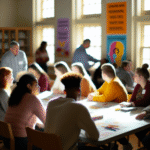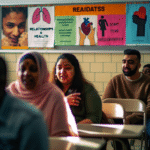In today’s connected world, fostering respect and communication in relationships is as vital as understanding one’s body’s health. This exploration into sexual health education uncovers pivotal elements like contraceptive knowledge, body awareness, and respect, paving the way for healthier, informed relationships.
Understanding Comprehensive Sexual Health Education
Comprehensive sexual health education equips individuals with the essential knowledge and skills for navigating the complexities of intimate relationships. It transcends mere biological facts, emphasizing informed decision-making and the cultivation of respectful relationships. Through discussions about body awareness, one learns to understand personal boundaries and the significance of consent. This holistic approach includes safety in closeness, guiding individuals toward health-conscious intimacy, emotional wellness, and the importance of communication, ensuring that personal health safety and supportive care are seamlessly integrated into their relationships.
Tools for Healthy Relationships
Establishing healthy relationships necessitates effective tools to foster communication and trust. Active listening exercises, such as reflective listening, encourage partners to articulate their thoughts and feelings while the other listens attentively. This promotes understanding and reduces misunderstandings. Trust-building activities, like sharing personal stories or engaging in joint decision-making, enhance connection and openness. Additionally, practicing safe touch awareness reinforces comfort with physical intimacy. Incorporating emotional wellness resources, such as stress management techniques, further supports a nurturing environment where both partners feel valued and respected.
Contraceptive Knowledge and Personal Safety
Contraceptive knowledge is pivotal in personal health care, empowering individuals to make informed lifestyle choices regarding intimacy. Understanding various contraceptive methods not only prevents unintended pregnancies but fosters communication with partners about desires and boundaries. It cultivates a sense of responsibility and encourages mutual respect. Knowledge of reproductive health, combined with information on safe practices, enhances one’s ability to prioritize personal safety. This education paves the way for healthier relationships, aligning with the values of trust and wellness emphasized in respectful connections.
Body Awareness and Emotional Wellness
Body awareness education plays a crucial role in fostering emotional wellness, enhancing individuals’ capacities to engage in healthy relationships. By cultivating a deep understanding of their own bodies, individuals can develop personal health safety and recognize their own boundaries. This self-awareness not only empowers thoughtful connection but also supports informed decision-making in intimate situations. As individuals become more attuned to their emotional responses and physical sensations, they are better equipped to communicate openly and honestly, thereby nurturing trust and respect within their relationships.
Respectful Intimacy and Trust
Health-based intimacy education plays a crucial role in fostering respectful relationships by emphasizing trust and clear boundaries. By equipping individuals with knowledge about safe touch, emotional care, and personal health safety, it empowers them to navigate intimacy with confidence. Key tools include:
– **Communication Skills**: Encouraging open dialogue about desires and limits fosters mutual respect.
– **Informed Decision-Making**: Understanding contraceptive options and personal boundaries informs healthier choices.
– **Emotional Wellness Resources**: Tools that support emotional health enhance connection and care within relationships.
This framework cultivates a culture of safety and respect, laying the foundation for meaningful connections.
Summary of Key Points
Comprehensive sexual health education equips individuals with the knowledge and tools necessary to build respectful and informed relationships. By understanding the dynamics of trust, communication, and personal boundaries, we empower ourselves to make safer and more responsible choices.






Leave a Reply